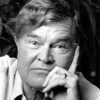Paul Fussell

Paul Fussell
Paul Fussell, Jr.was an American cultural and literary historian, author and university professor. His writings cover a variety of topics, from scholarly works on eighteenth-century English literature to commentary on America's class system. Fussell served in the 103rd Infantry Division during World War II and was wounded in fighting in France. Returning to the US, Fussell wrote extensively and held several faculty positions, most prominently at Rutgers Universityin New Brunswick, New Jersey, and at the University of Pennsylvania in Philadelphia,...
NationalityAmerican
ProfessionHistorian
Date of Birth22 March 1924
CountryUnited States of America
A guide book is addressed to those who plan to follow the traveler, doing what he has done, but more selectively. A travel book, in its purest, is addressed to those who do not plan to follow the traveler at all, but who require the exotic or comic anomalies, wonders and scandals of the literary form romance which their own place or time cannot entirely supply.
And the ideal travel writer is consumed not just with a will to know. He is also moved by a powerful will to teach.
Travel at its truest is thus an ironic experience.
The wise traveler learns not to repeat successes but tries new places all the time.
Exploration belongs to the Renaissance, travel to the bourgeois age, tourism to our proletarian moment.The explorer seeks theundiscovered, the traveler that which has been discovered by the mind working in history,the tourist that which has been discovered by entrepreneurship and prepared for him by the arts of mass publicity.If the explorer moves toward the risks of the formless and the unknown, the tourist moves toward the security of pure cliché. It is between these two poles that the traveler mediates. ...
All the pathos and irony of leaving one's youth behind is thus implicit in every joyous moment of travel: one knows that the first joy can never be recovered, and the wise traveller learns not to repeat successes but tries new places all the time.
Travel at its truest is thus an ironic experience, and the best travellers . . . seem to be those able to hold two or three inconsistent ideas in their minds at the same time, or able to regard themselves as at once serious persons and clowns.
We were going to live. We were going to grow up to adulthood after all.
The simple is carefully shunned by those who labour to seem what they would be.
Today the Somme is a peaceful but sullen place, unforgetting and unforgiving. ... To wander now over the fields destined to extrude their rusty metal fragments for centuries is to appreciate in the most intimate way the permanent reverberations of July, 1916. When the air is damp you can smell rusted iron everywhere, even though you see only wheat and barley.
What someone doesn't want you to publish is journalism; all else is publicity.
The more violent the body contact of the sports you watch, the lower the class.
Understanding the past requires pretending that you don't know the present. It requires feeling its own pressure on your pulses without any ex post facto illumination.
Understanding the past requires pretending that you don't know the present.